|
|
|
Sort Order |
|
|
|
Items / Page
|
|
|
|
|
|
|
| Srl | Item |
| 1 |
ID:
002860
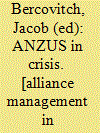

|
|
|
|
|
| Publication |
New York, St. Martin's press, 1988.
|
| Description |
xix, 267p.
|
| Standard Number |
0312012233
|
|
|
|
|
|
|
|
|
|
|
|
Copies: C:1/I:0,R:0,Q:0
Circulation
| Accession# | Call# | Current Location | Status | Policy | Location |
| 034378 | 355.0310994/BER 034378 | Main | On Shelf | General | |
|
|
|
|
| 2 |
ID:
083327
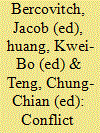

|
|
|
|
|
| Publication |
London, Routledge, 2008.
|
| Description |
xvi, 288p.
|
| Standard Number |
9780415403535
|
|
|
|
|
|
|
|
|
|
|
|
Copies: C:1/I:0,R:0,Q:0
Circulation
| Accession# | Call# | Current Location | Status | Policy | Location |
| 053838 | 341.52/BER 053838 | Main | On Shelf | General | |
|
|
|
|
| 3 |
ID:
102493


|
|
|
|
|
| Publication |
2011.
|
| Summary/Abstract |
Conflict between states, as well as between governments and non-state actors, continues to pose one of the most serious threats to individuals in the international community today. In an effort to reduce the destruction caused by these conflicts, a number of interventions, processes, and conflict management methods have been attempted. One of these methods involves facilitating conditions for positive contact between the disputants thus enabling them to develop a rapport of some sort. While this idea has received widespread theoretical support, there is little empirical analysis considering the benefits of such an approach. Here we examine how the context in which contact occurs can affect conflict management; we outline the assumptions that underpin conditions of the context, and discuss strategies, such as interactive problem solving, that have at their heart the goal of improving conditions of contact and communication as a prelude to conflict resolution. Our research goes beyond most studies, in that we subject the ideas of various conditions of contact and communication to an empirical test. We develop specific hypotheses on the role and relevance of the conditions of contact, and investigate the extent to which conflict management techniques can create positive conditions to contribute to conflict resolution. An original dataset including various conflict management techniques is examined to analyze our hypotheses. Findings indicate that factors such as the rank of a mediator and the type of conflict are more significant predictors of successful conflict management than the involvement of a third party facilitator. We examine both interstate conflicts and civil conflict to determine whether these different types should be managed differently.
|
|
|
|
|
|
|
|
|
|
|
|
|
|
|
|
| 4 |
ID:
088758


|
|
|
|
|
| Publication |
2009.
|
| Summary/Abstract |
The awarding of the 2008 Nobel Peace Prize to former President Martti Ahtisaari, Finland, cites his involvement in the settlement of the Aceh conflict. This at the same time highlights the lack of such efforts in the regions of Southeast Asia and the South Pacific. While internal conflicts throughout the world often tend to be resilient to conflict management initiatives, conflicts in the Asia-Pacific region have proven to be particularly difficult to resolve. Internal conflicts in Southeast Asia and the Pacific often concern territorial issue, for instance, East Timor and ethnically based conflicts in Myanmar. This is also true for conflicts in the South Pacific, notably in Bougainville (Papua New Guinea) and New Caledonia (France). Territorial conflicts last longer, are more difficult to manage, and generally produce more adverse consequences than those over other issues such as ideology, government, and national power.
|
|
|
|
|
|
|
|
|
|
|
|
|
|
|
|
| 5 |
ID:
089014
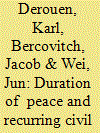

|
|
|
|
|
| Publication |
2009.
|
| Summary/Abstract |
Civil wars in Southeast Asia and the Pacific are perhaps the most intractable in the world and thus merit special attention. We adopt a regional approach for our analysis of the duration of peace after civil war terminations. Our contribution is three-fold: First, we capture all dyads (rebel versus government) rather than lumping multiple dyads into one war. This is appropriate in a region where there are multiple conflicts in a country at any one time. Second, we test a new conflict termination dataset developed at Uppsala University. These data allow us to offer a fine-grained analysis not normally found in the civil war literature. Third, we employ a method specifically suited to recurring data in a duration setting. The results generally support our hypotheses that wars in the region are intractable in the face of negotiated settlements and longer wars increase the duration of the subsequent peace. Also, there is a tendency for the peace to become longer with each recurrence. The impact of longer wars is obscured unless repeated events are carefully treated as non-independent events.
|
|
|
|
|
|
|
|
|
|
|
|
|
|
|
|
| 6 |
ID:
080834


|
|
|
| 7 |
ID:
114071
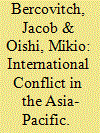

|
|
|
|
|
| Publication |
London, Routledge, 2010.
|
| Description |
x, 207p.Hbk
|
| Standard Number |
9780415580045
|
|
|
|
|
|
|
|
|
|
|
|
Copies: C:1/I:0,R:0,Q:0
Circulation
| Accession# | Call# | Current Location | Status | Policy | Location |
| 056708 | 303.69095/BER 056708 | Main | On Shelf | General | |
|
|
|
|
| 8 |
ID:
089533


|
|
|
|
|
| Publication |
London, Routledge, 2009.
|
| Description |
xviii, 311p.
|
| Standard Number |
9780415453097
|
|
|
|
|
|
|
|
|
|
|
|
Copies: C:1/I:0,R:0,Q:0
Circulation
| Accession# | Call# | Current Location | Status | Policy | Location |
| 054299 | 327.172/BER 054299 | Main | On Shelf | General | |
|
|
|
|
| 9 |
ID:
064479
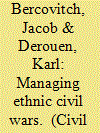

|
|
|
| 10 |
ID:
062338
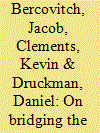

|
|
|
| 11 |
ID:
087308
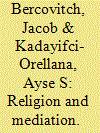

|
|
|
|
|
| Publication |
2009.
|
| Summary/Abstract |
Religion has often been thought of as playing a crucial role in generating conflicts, particularly internal ones. While it may often be a source of conflict, its role in the overall peace process has all too often been overlooked. In this paper we emphasize the importance of religion and religious actors in the process of mediation. We examine the general conditions that facilitate mediation in international relations and assess how much these hold true in the case of faith-based mediation. We find that aspects such as legitimacy and leverage have a major impact on the success or failure of mediation. We examine how these factors manifest themselves in the case of religious mediators, and we show that legitimacy and leverage are still crucial to successful mediation but have a very different meaning and content in the case of religious actors. We explore the consequences of these differences and explain how religious mediation may work best in tandem with the more traditional forms of mediation.
|
|
|
|
|
|
|
|
|
|
|
|
|
|
|
|
| 12 |
ID:
006066


|
|
|
|
|
| Publication |
London, Lynne Rienner Publishers, 1996.
|
| Description |
xiv, 297p.
|
| Standard Number |
1-55587-601-3
|
|
|
|
|
|
|
|
|
|
|
|
Copies: C:1/I:0,R:0,Q:0
Circulation
| Accession# | Call# | Current Location | Status | Policy | Location |
| 037712 | 341.52/BER 037712 | Main | On Shelf | General | |
|
|
|
|
| 13 |
ID:
079000


|
|
|
|
|
| Publication |
2007.
|
| Summary/Abstract |
The study of international mediation has long been dominated by single case studies or experimental approaches. This article argues for a more systematic approach and advocates a cross-national, longitudinal and empirical analysis of mediation based on actual historical data. The kind of information this approach can yield is invaluable in disentangling the structural aspects of mediation. This article presents the logic, rationale, and theory behind the most extensive data set on international mediation: the Correlates of Mediation Project. Data on all formal mediation events were collected for the period 1945- 1995. The structure of the data and some important findings are presented here. The advantages of data analysis are discussed and future challenges and developments are noted
|
|
|
|
|
|
|
|
|
|
|
|
|
|
|
|
|
|
|
|
|